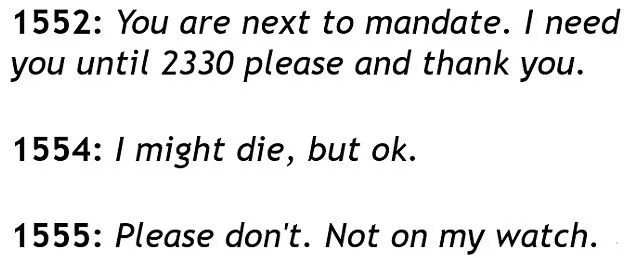
Courtesy of Joel Cooper

Audio By Carbonatix
Update: Family members confirmed that Cooper passed away on Friday afternoon.
Phoenix 911 dispatcher Pamela Cooper lays in a Mesa hospital bed, unconscious and unable to communicate. While Cooper can’t speak for herself, her messages from the fateful 15-hour shift she worked the night before she stopped breathing remain preserved in the dispatch center’s computer system.
Because of the way the system is set up, any employee can go in and read them, and a number of them have. Of the messages shared with Phoenix New Times by the dispatcher’s union, AFSCME Local 2960, one stands out:
1552: You are next to mandate. I need you until 2330 please and thank you.
1554: I might die, but ok.
1555: Please don’t. Not on my watch. I appreciate you getting back to me quick. Please help yourself to the Mando Mart [free food] over there.
1556: I just came back from covid for a month… I can barely walk or breathe. I will stay sitting 🙁
The “Mando Mart” to which Cooper’s supervisor refers is a collection of snacks put together by supervisors for when they “mandate” that employees stay past the end of their typical 10-hour shift. A regular occurrence in the understaffed dispatch center, a mandate is why Cooper, an asthmatic still recovering from six weeks of fighting the aftereffects of COVID-19, was required to work for more than 15 hours in late February, her first week back from sick leave. The 20-year 911 veteran told her mother that she feared discipline if she didn’t comply.
The city is now investigating what happened to Cooper. A spokesperson would not comment on the details of the investigation, but the messages – as well as the supervisor’s previous discipline issues – could play a part in it.
Frank Piccioli, president of AFSCME Local 2960, said Cooper should have been sent home as soon as she reported trouble breathing. He called the environment in police dispatch “hostile.”
“It shows that they’re creating an environment that’s pushing people past their limits,” he said of the messages. “They are literally working them to death.”
Citing New Times’ story on Cooper, Councilmember Betty Guardado took a moment at the beginning of a council session Tuesday to call for an independent investigation and for improved working conditions at the dispatch center. Guardado, who has spoken up previously on those conditions, said she was “heartbroken” by what happened to Cooper.
City manager Ed Zuercher told Guardado that he had asked the human resources department to review what happened. He said that the city was about to raise the salary for entry-level dispatchers, and that a planned study on how dispatchers are classified and paid would go before the council for possible approval in April or early May.
Guardado told New Times Wednesday she expects to see hourly starting pay increase immediately by $3.10. She said she’s glad the city is taking the issue seriously, but that it shouldn’t have taken this long. She credited workers for speaking out and forcing the city to change.
“That is how companies operate and the city is no different,” she said.
While she had initially called for an independent investigation, Guardado said she hoped the city’s investigation will be good enough and that the council would push on the issue if not.
Mayor Kate Gallego also expressed her sympathy in a statement to New Times, noting that an investigation was ongoing and saying she wanted to respect the privacy of Cooper’s family.
Cooper’s condition remains largely the same as it’s been since Cooper collapsed at home on February 27, her mother, Shirley Ryan, said. Doctors didn’t expect her to last this long and were considering surgery to relieve the swelling on her brain, but a neurosurgeon said there wasn’t much that could be done. She remains on life support, unlikely to survive.
The one consolation to Cooper’s hanging on to life is that it gave time for her brother to fly in from Chicago to see her. Her plight has drawn attention from dispatchers across the nation, and a GoFundMe has been set up, but Ryan said she hadn’t been contacted by anyone at the city besides representatives of the union and city support services.
“No one of any authority whatsoever,” she said. Ryan said they’ve gotten an attorney and she expects to “lock horns” with the city if she feels they’re not handling the situation appropriately.
“Truthfully, that’s them investigating themselves,” she said. “What do you expect from that?”
City communications director Dan Wilson declined to comment on the investigation for now. He confirmed the starting pay bump will occur on Monday and that the council will consider increasing the pay grade of all in the “public safety communications” category.
“This financial reward will impact employees who continue to provide this important public service to our community throughout their career with the city,” he wrote in an email.
Wilson said that dispatchers grappling with Cooper’s condition have access to counseling and other support services.
In a statement to a local TV station about Cooper, the city claimed that “…employees who notify their supervisor of illness are instructed to return home.”
The messages between Cooper and her supervisor appear to document that is not the case.
Wilson would not comment on the messages, citing the investigation, but New Times has also confirmed that the ID number of the supervisor Cooper was messaging with corresponds to city employee Dustin Dionne. Dionne is a former police officer who was at one point fired from the department and twice had his peace officer certification revoked.
His troubles on the police force stemmed from a 2013 off-duty road-rage incident in which he followed a driver who he claimed had repeatedly brake-checked him on the freeway. When they pulled into a parking lot and the man came at him, yelling, Dionne pulled his gun and held it at his side, causing the man to back off. He later claimed falsely to police investigators that the man had followed him.
Scottsdale police eventually submitted a felony disorderly conduct charge against Dionne in connection with the incident. Prosecutors declined to pursue it, but the incident cost him his job and earned him a place on the Brady list of dishonest cops, obtained by Phoenix TV station ABC15. He was able to get reinstated at the Phoenix Police Department on appeal, but the Arizona Peace Officer Standards and Training Board (POST) revoked his peace officer certification once in 2017, and again in 2019 after a court sent the decision back to them.

New Times
Dionne did not respond to an inquiry send to his work email or his Facebook page on Thursday. His wife did not respond to a message sent through her website, and his attorney for the de-certification case did not return a message left with a receptionist.
Despite the supervisor’s troubled history, Cooper’s health problem resulted not simply from Dionne’s mandate to keep working, but from a work system that led to the mandate.
“Dustin got caught up in the directives of upper management unfortunately,” said dispatcher Dorie Levy, speaking in her role as a union rep. “All supervisors come across as uncaring when it comes to ordering employees to hold over.”
Since New Times wrote about Cooper on Monday, a number of people who say they are current and former dispatchers with concerns about the conditions in 911 dispatch reached out.
One dispatcher said she’s seen people throw up and then return to work, and that the prevailing attitude in the office is that people often keep working when they’re sick.
Another said what happened to Cooper was predictable.
“We knew it was going to happen,” she said. “We just didn’t know it was going to be one of us. She deserved to retire.”
The two spoke to New Times on the condition of anonymity due to department regulations. Levy said that another employee had a similar situation to Cooper and ended up in the hospital last year. She has since recovered and was given a direct order to not speak to the media.
Victoria Bracken, who retired in September, said that she never felt pressure from her supervisors, but nobody wanted to increase the burden on others by going home sick. Since she retired and COVID-19 hit the dispatch center in earnest over the winter, she said things have gotten worse for the remaining coworkers.
“They’re just exhausted. Working overtime all the time. Getting mandated,” she said. “They’re just tired.”
Bracken confirmed what union representatives had told New Times about a lack of COVID-19 precautions until recently. She said that when she left in September, only one plexiglass barrier had been installed and that 911 workers were bringing in their own cleaning supplies due to the lack of wipes from the city. Cooper’s mother believes her daughter contracted COVID-19 at work due to lack of proper cleaning.
Wilechia Burns, a current dispatcher who also spoke in her capacity as a union representative, said what happened to Cooper has sunk morale even further, leaving employees even more “angry and frustrated.” She said she heard three dispatchers talking about leaving the other day.
“The whole environment needs to change,” she said, “you can cut the tension in the room with a knife sometimes, and that needs to start at the top.”
Jason Stokes, president of an association that represents dispatch supervisors, ASPTEA, said he didn’t know enough about the current dynamics in police dispatch to comment, but that the lack of staffing was causing a difficult situation. He said supervisors want to offer dispatchers flexibility – to take time off and do other things that prevent burnout – but they also have to keep call-response times down.
“Balancing the two issues is difficult, it’s impossible, without the staff,” he said.